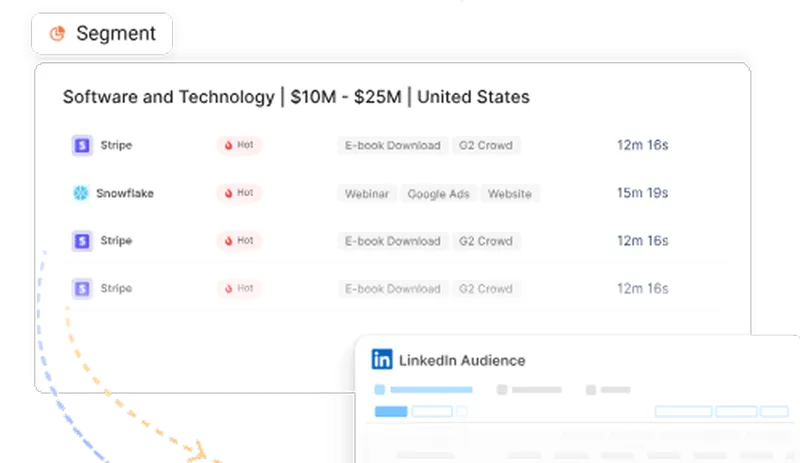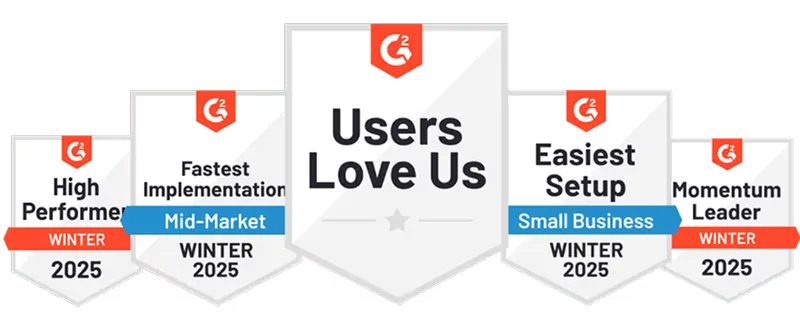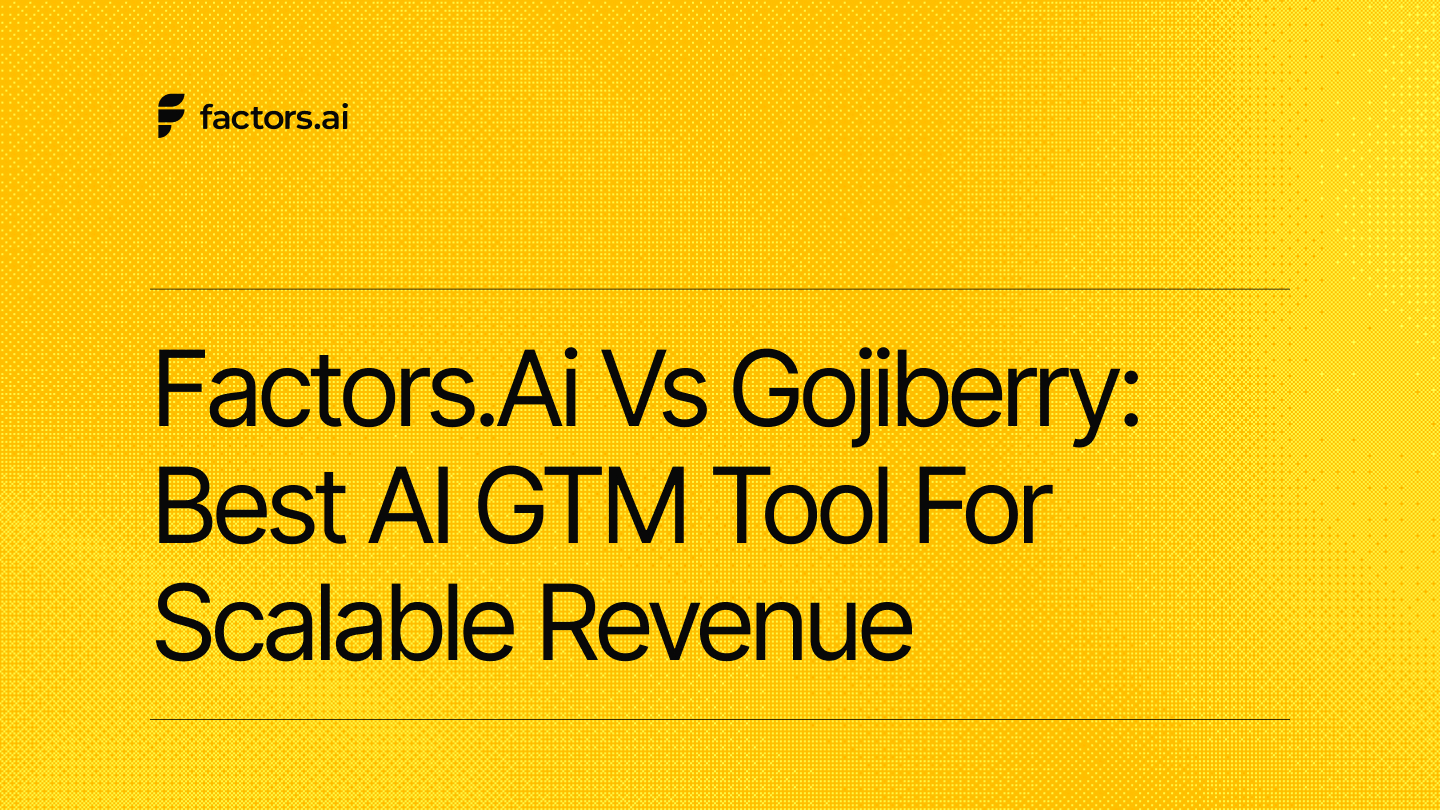Top 10 RollWorks Alternatives for Effective Account-Based Marketing
Explore the best RollWorks alternatives to enhance your Account-Based Marketing strategy. Compare features, pricing, and pros & cons to find the perfect ABM tool for your business. Discover top options like Terminus, Demandbase, and more.
Businesses increasingly turn to Account-Based Marketing (ABM) to tailor their outreach and boost engagement with key accounts. RollWorks, with its powerful ABM platform that integrates smoothly with Salesforce, is a standout option for companies seeking comprehensive tools to streamline targeted campaigns and unify sales and marketing efforts.
However, as businesses grow and their ABM needs change, they may find it beneficial to explore other platforms that offer specialized features or better align with their unique goals. This introduction highlights 10 noteworthy alternatives to RollWorks, each bringing its own strengths to enhance ABM strategies and drive customer acquisition and retention.
Overview of RollWorks
RollWorks is a robust Account-Based Marketing (ABM) platform within the NextRoll family. It focuses on helping B2B companies identify, target, and engage with key accounts through data-driven insights. The platform integrates smoothly with Salesforce, ensuring data synchronization and offering a unified view of customer interactions. It’s designed to enhance the efficiency of marketing and sales teams through AI-powered tools and comprehensive analytics.
Key Features
- AI-Powered Lead Scoring: Automates the identification of high-value leads based on predictive models.
- Personalized Outreach: Facilitates targeted engagement through email, social media, and other channels.
- Salesforce Integration: Ensures seamless data flow between RollWorks and Salesforce CRM.
- Comprehensive Analytics: Provides detailed insights into campaign performance, helping to measure ROI effectively.
- Account Targeting: Allows businesses to focus on the most promising accounts.
Pros
- Ease of Use: The platform is user-friendly, making it accessible even for teams with limited ABM experience.
- Effective Targeting: RollWorks identifies and reaches the right audience segments, enhancing campaign efficiency.
- Integration Capabilities: Its strong integration with Salesforce and other tools ensures smooth data management and workflow.
- Scalability: Suitable for businesses of various sizes, from small enterprises to large corporations.
Cons
- Learning Curve: Some users may find the platform complex initially, requiring time to leverage its capabilities fully.
- Cost: RollWorks can be expensive, especially for smaller companies with limited budgets.
- Limited Reporting Customization: While the analytics are comprehensive, some users might have limited reporting customization options.
{{INLINE_CTA_A}}
Pricing
RollWorks offers various pricing tiers based on a business's needs, but detailed pricing is typically provided upon request. The platform is a significant investment, particularly for smaller companies.
Here are 10 Rollworks Alternatives
Demandbase One

Overview
Demandbase One is a Smarter GTM™ (Go-To-Market) platform designed to help sales and marketing teams achieve their revenue goals with fewer resources. By leveraging Account Intelligence — rich, reliable account-level insights — the platform orchestrates sales and marketing strategies, injecting relevance into every stage of the B2B buying journey. It provides a unified view, connecting all sources of intelligence and insights with sales and marketing activities. This integration enables teams to identify opportunities earlier, engage more intelligently, and close deals faster.
The platform allows the creation of precise audiences using Account Intelligence, CRM and MAP data, intent signals, technographics, and more. It includes capabilities to enhance precision and control: a B2B advertising platform optimized to reach whole buying teams, personalized website conversions, coordinated customer interactions across ecosystems and channels, and comprehensive measurement of how marketing and sales activities drive pipeline and revenue. Additionally, sellers can use their CRM apps to access intelligent insights on contacts and companies, including Demandbase engagement and intent activity. Demandbase One's ABM/ABX/Sales Intelligence coordinates all GTM touches for a seamless buying experience.
Key Features
- Data Availability:
- Contact Data Availability: Access to extensive contact data to support targeted marketing and sales efforts.
- Company Data Availability: Comprehensive company data to enhance account-based strategies.
- Industry Research Availability: Industry-specific insights to refine targeting and engagement strategies.
- Data Accuracy:
- Contact Data Accuracy: High accuracy in contact data to ensure effective communication and engagement.
- Company Data Accuracy: Reliable company data accuracy to support informed decision-making.
- Features:
- Lead Builder: Tools to create and manage leads efficiently.
- Integration to CRM/Marketing Automation: Seamless integration with CRM and marketing automation platforms.
- Data Cleaning/Enrichment: Capabilities to clean and enrich data for better accuracy and usability.
- Data Segmentation/Filtering: Advanced segmentation and filtering options to target specific audiences.
- Search: Powerful search functionalities to find relevant data quickly.
- News/People Alerts: Alerts for news and updates related to key contacts and companies.
- Connections: Tools to identify and leverage connections within target accounts.
- Reporting: Comprehensive reporting features to track performance and outcomes.
- Messaging: Messaging capabilities to communicate effectively with prospects and customers.
- Lead Intelligence: Insights into lead behavior and preferences.
- Account-level Insights: Detailed insights at the account level to drive strategic decisions.
Pros
- Ease of Use: Highly user-friendly interface, making it accessible for users of all skill levels.
- Intent Data: Effective use of intent data to target potential buyers.
- Insights: Provides valuable insights to inform sales and marketing strategies.
- Intent Analysis: Advanced analysis of intent signals to identify high-potential leads.
- Easy Integrations: Smooth integration with existing CRM and marketing automation tools.
Cons
- Learning Curve: Some users may experience a steep learning curve initially.
- Inaccuracy Issues: Occasional inaccuracies in data may affect outcomes.
- Difficult Learning: Learning the full range of features and capabilities can be challenging for new users.
- Inaccuracy: Reports of data inaccuracy that may need addressing.
- Not User-Friendly: Some users find the interface less intuitive and user-friendly.
Pricing
For detailed pricing information, please visit the Demandbase website.
Terminus ABM Platform

Overview
Businesses now need much more than just traditional customer engagement and account management methods. Businesses are under increased pressure to maximize the efficiency of their marketing spend and deliver more targeted, effective campaigns. The Terminus ABM Platform is designed to meet these demands, providing a comprehensive solution that leverages first-party data to create engaging digital experiences across the entire account lifecycle—from acquisition to expansion and renewal.
Terminus is engineered to drive return on investment (ROI), minimize fraud, ensure brand safety, and transform intent data into actionable insights for go-to-market (GTM) teams. By integrating sophisticated lead intelligence and management capabilities with robust marketing campaign tools, Terminus enables businesses to stay ahead of the competition and achieve their strategic objectives.
Key Features
- Lead Intelligence
- Market Insights: Provides a broad view of market trends and dynamics, helping businesses to stay informed and agile.
- Account-level Insights: Delivers detailed information on key accounts, facilitating targeted engagement strategies.
- Lead Analysis: Enables deep dives into lead behavior and characteristics to refine targeting and improve conversion rates.
- Lead Management
- Segmentation: Allows for precise audience segmentation to tailor messages and campaigns for different market segments.
- Account Identification: Helps in pinpointing high-value accounts and prioritizing them for focused marketing efforts.
- Marketing Campaigns
- Omni-Channel Tracking: Monitors and tracks campaigns across multiple channels to provide a holistic view of marketing performance.
- Revenue Planning: Supports the planning and forecasting of revenue outcomes from marketing activities.
- Media Attribution: Links marketing activities to business outcomes, attributing value to different media and channels.
- Opportunity Timeline: Visualizes the timeline of opportunities to optimize follow-ups and sales processes.
- Customization: Offers tools to tailor campaigns and marketing strategies to specific business needs.
- Platform Additional Functionality
- Multivariate Testing: Facilitates A/B testing and other experimental approaches to optimize campaigns.
- Integrations: Seamlessly integrates with other business tools and platforms to enhance functionality and data flow.
- Platform Basics
- Retargeting: Enables retargeting campaigns to re-engage potential leads who have shown interest but have not yet converted.
- Platform Data
- Campaign Measurement: Provides comprehensive metrics to assess the effectiveness of marketing campaigns.
- Attribution: Offers robust attribution models to understand the impact of different marketing activities on business outcomes.
Pros
- Ease of Use: Rated highly for user-friendly interfaces and intuitive design.
- Features: Extensive feature set that covers all aspects of ABM.
- Audience Targeting: Effective targeting capabilities for precise audience segmentation.
- Customer Support: Generally positive feedback on the responsiveness and helpfulness of customer support.
- ABM Management: Strong capabilities in managing and optimizing account-based marketing activities.
Cons
- Missing Features: Some users report the absence of certain desired features.
- Reporting Issues: Occasional challenges with generating and interpreting reports.
- Integration Issues: Difficulties in integrating with certain third-party tools.
- Limited Analytics: The analytics capabilities may not be as advanced as some users require.
- Not User-Friendly: A few users find certain aspects of the platform less intuitive or harder to navigate.
Pricing
Visit the Terminus website for detailed pricing information. Pricing typically varies based on the specific needs and scale of the business, including the number of users and the level of features and support required.
Factors

Overview
Factors is a leading AI-powered platform that excels in helping marketing and sales teams identify and target high-value accounts. It offers comprehensive tools for automating and optimizing account-based marketing (ABM) strategies. Factors integrates smoothly with existing CRM systems, making it a viable alternative to RollWorks, especially for businesses looking for advanced AI capabilities and deeper insights into account behavior.
Key Features
- AI-Powered Insights
- Advanced AI tools provide predictive analytics and lead scoring.
- Behavioral Analytics
- In-depth analysis of account behaviors to refine targeting.
- Customizable Dashboard
- Allows users to create tailored dashboards for different teams.
- Seamless CRM Integration
- Works well with major CRMs like Salesforce and HubSpot.
- Multi-Channel Campaigns
- Supports campaigns across various channels, including email, social media, and the web.
6. AdPilot:
- Maximize your LinkedIn Ads ROI with Factors' LinkedIn AdPilot. This platform enhances your ad strategy with features like campaign automation, intent-based audience building, view-through attribution, smart reach optimization, and seamless integration with Factors' conversions API.
7. G2 Intent:
- Integrates G2 intent data, empowering businesses to pinpoint which accounts are actively exploring their product category.
- This allows for prioritizing high-intent accounts, resulting in more precise marketing and sales efforts and a higher probability of conversion.
8. Account Deanonymization:
- Businesses can uncover and analyze anonymous website visitors.
- By collecting firmographic data such as company name, industry, and size, companies can personalize their outreach and fine-tune their marketing strategies.
9. Custom Workflows:
- Offers customizable workflow automation that enables marketing and sales teams to streamline operations across CRM systems and campaign management tools.
- These tailored workflows enhance operational efficiency and ensure cohesive alignment across go-to-market teams.
Also Read: Set Up Sales Automation Workflows Using Factors
Pros
- Advanced AI Capabilities: Offers highly sophisticated AI-driven insights, improving targeting accuracy.
- User-Friendly Interface: Intuitive and easy to navigate, even for users new to ABM platforms.
- Customizability: Allows a high degree of customization, particularly in reporting and dashboards.
- Comprehensive Support: Strong customer support with detailed documentation and onboarding assistance.
Cons
- Pricing: Can be on the higher end, which might be a barrier for smaller businesses.
- Complexity: The extensive features might overwhelm users who require only basic functionalities.
- Limited Integrations: While it integrates well with major CRMs, there might be fewer integration options compared to RollWorks.
Pricing
Factors typically offers tiered pricing based on business size and specific needs. Like RollWorks, it is generally tailored for larger enterprises, and detailed pricing information is usually available upon request.
{{INLINE_CTA_A}}
Metadata.io

Overview
Metadata.io offers a Marketing Operating System (OS) tailored for B2B marketers, designed to streamline and automate the complex processes involved in driving revenue. By leveraging advanced automation, Metadata.io allows marketers to focus on high-value tasks such as strategy and creativity, rather than getting bogged down in manual, repetitive work. The platform covers everything from audience building to running paid campaigns and optimizing them for revenue, thus enhancing efficiency and effectiveness.
Key Features
- Lead Intelligence
- Account-level Insights: Provides deep insights at the account level to understand potential leads better.
- Lead Analysis: Offers detailed analysis of leads to help prioritize and target the most promising prospects.
- Lead Management
- Segmentation: Allows for precise segmentation of leads to tailor marketing efforts more effectively.
- Account Identification: Identifies key accounts to focus marketing and sales efforts on high-value targets.
- Marketing Campaigns
- Media Attribution: Tracks the effectiveness of different media channels in driving conversions.
- Omni-Channel Tracking: Provides comprehensive tracking across multiple marketing channels.
- Opportunity Timeline: Maps out the timeline of opportunities to better understand the customer journey.
- Customization: Offers extensive customization options to tailor campaigns to specific needs.
- Platform Basics
- Retargeting: Enables retargeting to engage potential customers who have interacted with your brand previously.
- Platform Data
- Campaign Measurement: Measures the performance of campaigns to assess their effectiveness.
- Attribution: Provides detailed attribution to understand which efforts are driving results.
- Platform Additional Functionality
- Multivariate Testing: Allows for testing multiple variables to optimize campaigns.
- Integrations: Integrates with various other tools and platforms to streamline workflow.
Pros
- Campaign Management (23 votes): Efficient and effective campaign management features.
- Customer Support (23 votes): High-quality customer support.
- Ease of Use (19 votes): User-friendly interface.
- Audience Targeting (15 votes): Precise audience targeting capabilities.
- Tracking Performance (12 votes): Robust performance tracking features.
Cons
- Editing Limitations (9 votes): Some limitations in editing capabilities.
- Difficult Learning (5 votes): Steep learning curve for new users.
- Integration Issues (5 votes): Occasional issues with integrations.
- Campaign Management (4 votes): Some users reported difficulties with campaign management.
- Complexity (4 votes): The platform can be complex and overwhelming for some users.
Pricing
For detailed pricing information, it is recommended to visit the Metadata.io website to get the most up-to-date and comprehensive pricing details.
HubSpot Marketing Hub

Overview
HubSpot Marketing Hub is designed to streamline and enhance the marketing efforts of modern businesses. It addresses common challenges faced by marketers who often deal with fragmented data and complex tools. With Marketing Hub, all marketing tools and customer data are integrated into a single platform, making it easier to manage and utilize effectively. This integration not only saves time but also enables marketers to deliver personalized experiences that attract and convert leads efficiently. Being part of the HubSpot CRM platform ensures that marketing efforts are aligned with sales goals, facilitating better ROI measurement and investment validation.
Key Features
- Email Marketing:
- Building and Personalizing Emails: Create and customize emails tailored to specific audiences.
- Sending Outbound Emails: Manage outbound email campaigns directly from the platform.
- Manage Email Deliverability: Monitor and optimize email deliverability rates.
- Automated Email Responses: Set up automated responses based on user actions or triggers.
- Online Marketing:
- Landing Pages and Forms: Design and deploy landing pages and forms to capture leads.
- Dynamic Content: Deliver personalized content based on user behavior or preferences.
- Mobile Optimized: Ensure all marketing assets are optimized for mobile devices.
- Lead Management:
- Marketing Lead Database: Store and manage leads effectively within the platform.
- Data Quality Management: Ensure data accuracy and cleanliness.
- Segmentation: Segment leads based on various criteria for targeted marketing.
- Lead Nurturing: Automate lead nurturing workflows to move leads through the sales funnel.
- Online Behavior Tracking: Track and analyze user behavior across digital channels.
- Automated Alerts and Tasks: Set up alerts and tasks based on lead interactions and behaviors.
- Reporting & Analytics:
- Basic Reporting: Access standard reports to track campaign performance and KPIs.
- Web Analytics: Monitor website performance and visitor behavior through integrated analytics tools.
Pros
- Ease of Use: HubSpot Marketing Hub is praised for its user-friendly interface and intuitive design.
- Marketing Management: Users appreciate the platform's capabilities for comprehensive marketing management.
- Email Marketing: Effective tools for building, sending, and managing email campaigns.
- Content Creation: Tools to create compelling and personalized content.
- Automation Benefits: Significant automation features that streamline marketing workflows.
Cons
- Limited Features: Some users find that certain advanced features they require may be lacking.
- Complex Usage: Despite its user-friendly design, some aspects of the platform can be complex to master.
- Limited Customization: The degree of customization may not meet the needs of all users.
- Learning Curve: New users may face a learning curve when first using the platform.
- Missing Features: Specific features desired by users may not be available in the current version.
Pricing
While not detailed here, pricing can sometimes be a concern for businesses, depending on their budget and needs.
Foundry ABM Platform

Overview
Foundry's Account-Based Marketing (ABM) platform is designed to streamline and optimize marketing and sales efforts across the entire buyer's journey. It integrates multiple functionalities into a unified platform powered by AI to enhance campaign effectiveness and drive engagement within target accounts.
Key Features
- Lead Intelligence
- Market Insights: Provides deep market insights to understand trends and opportunities.
- Account-level Insights: Delivers specific insights into individual target accounts.
- Lead Analysis: Analyzes lead behavior and engagement patterns.
- Account-level Insights: Offers detailed analytics at the account level.
- Lead Management
- Segmentation: Segments leads based on various criteria for personalized targeting.
- Account Identification: Identifies and prioritizes key target accounts for focused efforts.
- Marketing Campaigns
- Customization: Allows customization of campaigns based on segmented insights and identified accounts.
- Campaign Execution
- Website Personalization: Personalizes web experiences based on visitor data and account insights.
- Prioritized Accounts: Focuses campaign efforts on high-priority accounts for maximum impact.
- Platform Additional Functionality
- Integrations: Integrates with other marketing and CRM tools for seamless data flow and campaign management.
- Platform Data
- Campaign Measurement: Measures the effectiveness of campaigns with detailed analytics.
- Attribution: Provides insights into campaign attribution to understand ROI and effectiveness.
Pros
- Audience Targeting: Precision targeting of specific audiences and accounts.
- ABM Management: Comprehensive tools for managing ABM strategies effectively.
- Ease of Use: Generally rated as user-friendly for marketers and sales teams.
- Reporting: Robust reporting capabilities to track campaign performance.
- Campaign Management: Efficient tools for orchestrating and managing campaigns.
Cons
- Complexity: Some users find the platform complex, requiring a learning curve.
- Not User-Friendly: Mixed feedback on user-friendliness, particularly for new users.
- Poor Integration: Issues reported with integrating with other systems.
- Campaign Management: Challenges in managing complex campaigns efficiently.
- Integration Issues: Users have encountered difficulties with third-party integrations.
Pricing
Pricing details need to be reviewed on their official website for transparency. This will provide specific details on features, pricing, and additional functionalities Foundry ABM offers.
{{INLINE_CTA_A}}
ZoomInfo Sales

Overview
ZoomInfo Sales is a leading platform designed for B2B companies. It offers a comprehensive suite of tools to optimize sales and marketing efforts. At its core, ZoomInfo Sales boasts the largest and most accurate database of insights, intelligence, and purchasing intent data for companies and individual contacts. This data is continuously updated to ensure relevance and reliability.
In addition to its extensive data offerings, ZoomInfo Sales integrates various tools such as conversation intelligence (Chorus), sales engagement (Engage), and data orchestration (RingLead). These integrations enhance engagement with prospects and customers, ultimately empowering sales teams to achieve higher conversion rates and meet their targets more effectively.
Key Features
- Data Availability:
- Contact Data Availability
- Company Data Availability
- Industry Research Availability
- Data Accuracy:
- Contact Data Accuracy
- Company Data Accuracy
- Features:
- Lead Builder
- Integration with CRM/Marketing Automation platforms
- Data Cleaning/Enrichment
- Data Segmentation/Filtering
- Search Capabilities
- News and People Alerts
- Reporting Tools
- Platform Performance and Reliability
- Analytics
- Export/Import Functionality
- Lead Monitoring Features
Pros
- Comprehensive Data and Tools: Users appreciate ZoomInfo's extensive database and the array of tools available, such as lead building and integration with CRM systems.
- Ease of Use: The platform is noted for its user-friendly interface, making it easy to find and qualify leads.
- Effective for Tradeshows: Many users find ZoomInfo invaluable for preparing for tradeshows and strategic initiatives.
- Data Accuracy: High praise for the accuracy and reliability of the data provided.
Cons
- Potential for Over-Research: Some users easily get lost in the abundance of information available, which can distract from immediate action on leads.
- Learning Curve: Although generally user-friendly, new users may face a learning curve when navigating the platform's full capabilities.
Pricing
For detailed pricing information, it is recommended to visit ZoomInfo's official website or contact their sales team directly. You can also read our blog on ZoomInfo Pricing here.
Adobe Marketo Engage

Overview
Adobe Marketo Engage is a comprehensive marketing automation platform designed to empower marketing teams to drive demand and growth by delivering personalized customer experiences. In today's competitive landscape, where generic marketing tactics are less effective, Marketo Engage helps businesses integrate marketing and sales efforts seamlessly throughout the customer journey.
Challenges Addressed: Modern customers expect personalized interactions and are averse to generic marketing approaches and cold sales calls. To meet these expectations and stay competitive, marketing teams must deeply understand their customers. Marketo Engage assists in achieving this by leveraging customer data, content, automation, and analytics to personalize engagements at scale.
Key Features
- Email Marketing:
- Building and Personalizing Emails: Create customized emails tailored to specific customer segments.
- Sending Outbound Emails: Manage and automate outbound email campaigns.
- Manage Email Deliverability: Ensure emails reach recipients' inboxes effectively.
- Automated Email Responses: Set up automated responses based on customer interactions.
- Online Marketing:
- Landing Pages and Forms: Design and optimize landing pages and forms for lead capture.
- A/B Testing: Experiment with different versions of content to optimize performance.
- Mobile Optimized: Ensure marketing assets are optimized for mobile devices.
- Lead Management:
- Segmentation: Categorize leads into segments based on demographics, behavior, etc.
- Lead Scoring and Grading: Prioritize leads based on their likelihood to convert.
- Lead Nurturing: Engage leads with targeted content to move them through the sales funnel.
- Online Behavior Tracking: Monitor and analyze how leads interact with online content.
- Automated Alerts and Tasks: Set up notifications and tasks based on lead behavior.
- CRM Lead Integration: Sync lead data with CRM systems for unified customer insights.
- Campaign Management:
- Program Management: Plan, execute, and manage marketing campaigns across channels.
- Reporting & Analytics:
- Basic Reporting: Generate reports to track campaign performance and measure ROI.
Pros
- Ease of Use: Marketo Engage is known for its user-friendly interface.
- Marketing Automation: Comprehensive tools for automating marketing processes.
- Email Marketing: Robust capabilities for personalized email campaigns.
- Customer Engagement: Facilitates personalized customer interactions.
- Automation Efficiency: Improves efficiency in marketing operations.
Cons
- Learning Curve: Some users find the platform initially challenging to master.
- Expensive: Higher pricing compared to some other marketing automation solutions.
- Not Intuitive: Interface may not be as intuitive for all users.
- High Complexity: Can be complex, especially for smaller teams without dedicated resources.
- Poor Customer Support: Some users report issues with customer support responsiveness.
Pricing
For detailed pricing information, it's best to visit Adobe Marketo Engage's official website as pricing can vary based on features, deployment options, and organizational needs.
{{INLINE_CTA_A}}
Salesforce Marketing Cloud Account Engagement

Overview
Salesforce Marketing Cloud Account Engagement is a comprehensive marketing automation platform designed to enhance collaboration between sales and marketing teams, ultimately driving efficient growth. Integrated with Salesforce's CRM and service solutions, it provides a unified view of customer interactions and campaign performance, ensuring consistent and personalized customer experiences.
Key Features
- Email Marketing:
- Build and personalize emails
- Manage email deliverability and automated responses
- Online Marketing:
- Create mobile-optimized landing pages and forms
- Lead Management:
- Maintain a marketing lead database
- Ensure data quality management and segmentation
- Implement lead scoring, nurturing, and CRM integration
- Track online behavior and automate alerts/tasks
- Reporting & Analytics:
- Basic reporting capabilities to measure campaign performance and ROI
Pros
- Ease of Use: User-friendly interface makes it accessible for marketers.
- Marketing Automation: Streamlines marketing processes and improves efficiency.
- Customer Engagement: Facilitates personalized customer interactions.
- Email Marketing: Robust tools for effective email campaign management.
- Automation Efficiency: Saves time and enhances productivity.
Cons
- Learning Curve: Complex functionalities may require time to master.
- Expensive: High cost of ownership, especially for smaller businesses.
- High Complexity: Comprehensive features may be overwhelming.
- Missing Features: Some advanced features may not be included in basic packages.
- Not Intuitive: The interface may not be intuitive for all users.
Pricing
For detailed pricing information, visit Salesforce's official website or contact their sales team directly. Pricing typically varies based on the scale of deployment, features selected, and specific business needs.
StackAdapt

Overview
StackAdapt is a prominent multi-channel advertising platform specializing in various advertising solutions, including native, display, video, connected TV (CTV), audio, in-game, and digital-out-of-home (DOOH) ads. The platform integrates advanced machine learning capabilities with a user-friendly interface, focusing on the core aspects of programmatic advertising: planning, executing, and analyzing campaigns.
Key Features
- Video Functionality:
- Enables comprehensive management and optimization of video ad campaigns across various channels.
- Campaign Management:
- Campaign Dashboard: Provides a centralized view of campaign performance and key metrics.
- Campaign Optimization: Tools for optimizing ad campaigns to improve performance.
- Reach and Brand Safety: Ensures ads reach the right audience while maintaining brand safety standards.
- Frequency Capping: Controls how often users see ads to prevent overexposure.
- Budget Pacing: Manages spending to ensure campaigns stay within budget.
- Creative Optimization: Tools for improving ad creative to enhance engagement.
- Targeting:
- Targeting: Allows precise targeting based on demographics, behavior, and interests.
- Retargeting: Engages users who have previously interacted with ads or websites.
- Geo-Targeting: Targets users based on geographic location.
- Contextual Targeting: Places ads in relevant content contexts to enhance relevance.
- Platform:
- Custom Reports: Generates tailored reports to track campaign performance.
- User, Role, and Access Management: Manages user permissions and access levels.
- Performance and Reliability: Ensures reliable performance to support high-demand advertising campaigns.
Pros
- Helpful Customer Support: High ratings for customer support responsiveness.
- Ease of Use: User-friendly interface that simplifies campaign management.
- Comprehensive Campaign Management: Tools for optimizing and managing ad campaigns effectively.
- High Customer Satisfaction: Recognized as a top DSP in customer satisfaction.
Cons
- Reporting Limitations: Some users report limitations in the platform's reporting capabilities.
- Functionality Limitations: Occasional feedback about limited features compared to other platforms.
- Pricing Concerns: Details about pricing structure and affordability may vary based on user needs.
Pricing
For specific pricing details, it's recommended to visit StackAdapt's official website or contact their sales team directly, as pricing structures can vary based on campaign specifics and user requirements.
Here’s Why Factors is the Best RollWorks Alternative
Factors stands out as a superior alternative to RollWorks for several compelling reasons. First and foremost, Factors excels in leveraging advanced AI and machine learning algorithms to provide highly accurate and actionable insights. Unlike RollWorks, which offers a more traditional approach to account-based marketing (ABM), Factors integrates cutting-edge technology to enhance data-driven decision-making and optimize marketing strategies.
Factors’ intuitive platform allows seamless integration with existing CRM and marketing tools, providing a unified view of customer interactions and engagement. This integration facilitates better targeting and personalization, improving campaign performance and ROI. Factors offers robust analytics and reporting features that deliver in-depth insights into campaign effectiveness, enabling marketers to refine their strategies based on real-time data.
Moreover, Factors's user-friendly interface and customizable features cater to businesses of all sizes, making it an accessible and versatile solution. The platform’s scalability ensures it can adapt to evolving business needs, unlike RollWorks, which may require more extensive adjustments as companies grow.
{{INLINE_CTA_A}}
LinkedIn AdPilot by Factors
LinkedIn AdPilot, a feature offered by Factors, provides a powerful tool for optimizing LinkedIn advertising campaigns. This advanced solution enhances ad performance by utilizing AI-driven insights to target the right audience precisely. LinkedIn AdPilot offers real-time analytics and automated recommendations, helping marketers refine their ad strategies and achieve better engagement and conversion rates. By integrating seamlessly with LinkedIn's advertising platform, AdPilot simplifies campaign management and boosts the effectiveness of ad spend, making it an invaluable asset for businesses looking to maximize their LinkedIn advertising efforts.
Exploring alternatives to RollWorks helps businesses find ABM platforms that better align with their specific needs and goals.
1. Factors.ai: AI-driven account intelligence, cross-channel intent capture, and seamless integrations to enhance ABM strategies.
2. Demandbase: Comprehensive ABM solutions with robust targeting and personalization features.
3. Terminus: Multichannel engagement and advanced analytics to drive account-based campaigns.
4. 6sense: Predictive analytics to identify and engage high-intent accounts effectively.
These platforms optimize ABM efforts, improve targeting, and increase ROI.
In a Nutshell
Selecting the optimal ABM platform depends on various factors, including organizational goals, scalability requirements, and the complexity of marketing operations. Each alternative to RollWorks offers distinct advantages, from advanced analytics and predictive capabilities to seamless CRM integration and simplified automation workflows.
Evaluating these alternatives ensures that ABM strategies remain adaptive and effective in achieving targeted growth and customer engagement objectives. Whether prioritizing personalized customer experiences, enhancing lead management capabilities, or optimizing campaign ROI, these alternatives provide diverse solutions tailored to meet the demands of modern B2B marketing environments.
See how Factors can 2x your ROI
Boost your LinkedIn ROI in no time using data-driven insights


See Factors in action.
Schedule a personalized demo or sign up to get started for free
LinkedIn Marketing Partner
GDPR & SOC2 Type II
.svg)










